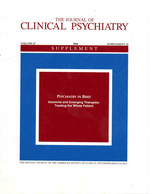
General Psychiatry
Scope & Guideline
Advancing mental health through open access research.
Introduction
Aims and Scopes
- Clinical Research and Interventions:
Focuses on empirical studies evaluating the effectiveness of various psychiatric treatments, including pharmacological and non-pharmacological interventions. - Psychiatric Epidemiology:
Explores the prevalence, risk factors, and societal impacts of mental health disorders across different populations and demographics. - Neuroscience and Psychopathology:
Investigates the biological and neurological underpinnings of psychiatric disorders, including genetic, neuroimaging, and biochemical studies. - Psychosocial Factors and Mental Health:
Examines the influence of social, cultural, and environmental factors on mental health outcomes, including issues like stigma, socioeconomic status, and community support. - Innovative Therapies and Technologies:
Explores new approaches in mental health care, including digital health interventions, telepsychiatry, and novel therapeutic modalities. - Public Health and Policy:
Discusses the implications of mental health research for public health policy, healthcare access, and health systems.
Trending and Emerging
- Digital Health and Telepsychiatry:
An increased focus on the use of digital tools and telehealth services to improve mental health access and outcomes, particularly in light of the COVID-19 pandemic. - Gut-Brain Axis Research:
Emerging studies are exploring the connections between gut health and psychiatric conditions, highlighting the importance of microbiota in mental health. - Mental Health and Chronic Physical Conditions:
Research is increasingly addressing the intersection of mental health and chronic physical illnesses, recognizing the bidirectional relationship between these health domains. - Impact of Social Determinants on Mental Health:
There is a growing emphasis on how social factors, such as socioeconomic status and community dynamics, affect mental health outcomes. - Innovative Neuromodulation Techniques:
Studies on novel neuromodulation therapies, such as transcranial magnetic stimulation and deep brain stimulation, are gaining prominence as potential treatments for resistant mental health disorders. - AI and Machine Learning in Psychiatry:
The application of artificial intelligence and machine learning techniques to predict mental health outcomes and personalize treatment approaches is a burgeoning area of interest.
Declining or Waning
- Traditional Psychotherapeutic Approaches:
There has been a noticeable decrease in papers solely focused on traditional psychotherapy methods, possibly due to a growing interest in integrated and technology-based interventions. - Single-Disease Focus Studies:
Research concentrating exclusively on individual psychiatric disorders without considering comorbidities is becoming less prevalent, reflecting a shift towards understanding mental health in a more holistic context. - Longitudinal Studies in Specific Populations:
The frequency of longitudinal studies focusing on specific demographic groups has declined, possibly due to challenges in maintaining participant engagement over time. - Descriptive Studies without Innovative Insights:
There is a reduction in purely descriptive studies that do not offer new insights or methodologies, as the journal increasingly favors innovative research that contributes to clinical practice. - Basic Science Focus:
Research that primarily addresses basic scientific questions without direct clinical implications has been less frequently published, as the journal emphasizes translational research.
Similar Journals

JOURNAL OF GERIATRIC PSYCHIATRY AND NEUROLOGY
Connecting research and practice in geriatric mental health.JOURNAL OF GERIATRIC PSYCHIATRY AND NEUROLOGY, published by SAGE PUBLICATIONS INC, is a premier academic journal dedicated to advancing the understanding of mental health issues and neurological disorders in the aging population. With an established presence since 1988, this journal stands out in the fields of Geriatrics, Gerontology, Neurology, and Psychiatry, currently positioned in the Q2 category based on 2023 metrics, reflecting its influence and academic rigor. The journal is indexed in major databases and is highly regarded for its contributions, as evidenced by its strong Scopus rankings. It serves as an essential resource for researchers, clinicians, and students, offering insightful articles that explore the complex interplay between aging, mental health, and neurological conditions. Although it does not provide open access, it continues to be a vital source of scholarly knowledge for those dedicated to enhancing the well-being of the elderly population.

Annals of General Psychiatry
Empowering Research for a Healthier MindAnnals of General Psychiatry is a leading open-access journal published by BMC, dedicated to advancing the field of psychiatry and mental health. Since its inception in 2005, the journal has provided a robust platform for researchers to disseminate peer-reviewed clinical and experimental studies, case reports, and reviews that address the broad spectrum of psychiatric disorders. With an impressive Q1 ranking in Psychiatry and Mental Health for 2023, and a notable Scopus rank of #128 out of 567 in its category, the journal plays a pivotal role in disseminating high-quality, impactful research within the global scientific community. The open access model guarantees wide visibility and accessibility of research findings, ensuring that professionals, students, and policymakers can utilize the latest advancements in the psychiatric field. The journal's presence from 2002 to 2024 further demonstrates its commitment to contributing valuable insights that are relevant to contemporary challenges in mental health.

Psychiatria Polska
Enriching understanding, enhancing practice in mental health.Psychiatria Polska is a distinguished journal published by WYDAWNICZY POLSKIEGO TOWARZYSTWA, focused on advancing the field of psychiatry and mental health. Established in 1967, this journal has become a vital resource for researchers, clinicians, and students, contributing to the understanding of psychiatric disorders and their treatments. With an ISSN of 0033-2674, it features a diverse range of studies, case reports, and reviews, making it an essential platform for sharing innovative findings within the psychiatric community. Although currently categorized in the Q3 quartile for both Medicine (miscellaneous) and Psychiatry and Mental Health in 2023, its increasing impact is evidenced by its Scopus ranking of #345 out of 567 in its category, placing it in the 39th percentile. Located in Cracow, Poland, Psychiatria Polska continues to foster international collaboration and knowledge exchange, despite being non-open access, ensuring that its high-quality content reaches a wide audience. This journal is dedicated to enhancing the dialogue on mental health, making it an indispensable resource for those committed to improving psychiatric practice and research.

Rivista di Psichiatria
Cutting-edge Insights into Psychiatry and Mental WellnessRivista di Psichiatria, published by PENSIERO SCIENTIFICO EDITORE, stands as a significant contributor to the field of Psychiatry and Mental Health since its inception in 1975. With an ISSN of 0035-6484 and an E-ISSN of 2038-2502, this esteemed journal offers a platform for rigorous academic discourse and cutting-edge research, helping to shape contemporary psychiatric practices and theories. Currently holding a Q2 designation in Psychiatry and Mental Health based on the 2023 category quartiles, and ranking #197 out of 567 in Scopus, it reflects a commendable 65th percentile among its peers. The journal welcomes contributions that encompass a broad range of topics related to mental health, encouraging contributions from a multidisciplinary approach, which aids in its goal of advancing the understanding and application of psychiatric science. While it is a traditional journal without Open Access options, access to its valuable content can support researchers, clinicians, and students in their pursuit of knowledge and innovation within the field. Situated in Rome, Italy, at VIA SAN GIOVANNI VALDARNO 8, ROME 00138, the journal continues to enhance its rich legacy, promoting the exchange of ideas and fostering collaboration amongst practitioners and scholars alike.

JOURNAL OF CLINICAL PSYCHIATRY
Transforming clinical psychiatry with evidence-based insights.The JOURNAL OF CLINICAL PSYCHIATRY is a premier publication dedicated to advancing the understanding and treatment of psychiatric disorders. Established in 1978 and published by Physicians Postgraduate Press, this esteemed journal provides a vital platform for researchers, clinicians, and mental health professionals to share innovative findings and evidence-based practices in psychiatry. With an impressive impact factor and recognized as a Q1 journal in both Medicine (miscellaneous) and Psychiatry and Mental Health, the journal ranks among the top in its field, sitting at 96th out of 567 in Scopus rankings, placing it in the 83rd percentile. The journal's commitment to high-quality, peer-reviewed articles facilitates the dissemination of knowledge crucial for advancing clinical practices and improving patient outcomes. Access to its latest research is offered through institutional subscriptions, making it an essential resource for anyone involved in the mental health sector, from seasoned practitioners to aspiring students.

PSYCHIATRY RESEARCH
Advancing psychiatric knowledge for a healthier tomorrow.PSYCHIATRY RESEARCH is a leading journal published by Elsevier Ireland Ltd, dedicated to advancing the field of psychiatry and mental health through the dissemination of rigorous research. With an impressive impact factor and categorized in the top quartile (Q1) of both Biological Psychiatry and Psychiatry and Mental Health in 2023, this journal ranks 14th in the field of Medicine _ Psychiatry and Mental Health out of 567 journals, and 4th in Neuroscience _ Biological Psychiatry out of 51, showcasing its influence and quality. Since its inception in 1979, PSYCHIATRY RESEARCH has provided a platform for innovative studies, clinical trials, and comprehensive reviews aimed at understanding the complexities of mental health disorders. Although it operates under a traditional access model, the journal remains committed to making vital research available to the academic community, ensuring that both seasoned professionals and budding researchers have access to groundbreaking findings. Positioned as a hub for psychiatric research, it caters to a diverse audience including clinicians, psychologists, and students, empowering them to contribute to the evolving landscape of mental health care.

Neuropsychopharmacology Reports
Illuminating the complexities of neuropsychopharmacology for a healthier future.Neuropsychopharmacology Reports is a leading open-access journal published by WILEY, dedicated to advancing the fields of clinical psychology, pharmacology, psychiatry, and mental health. Established in 2018, the journal aims to disseminate high-quality research findings, critical reviews, and innovative methodologies that elucidate the complexities of neuropsychopharmacology in enhancing mental health outcomes. With an impressive impact indicated by its Q2 rankings in several categories including Clinical Psychology and Pharmacology (medical) as of 2023, Neuropsychopharmacology Reports stands out as a vital resource for researchers, professionals, and students keen on exploring the interplay between pharmacological interventions and psychological well-being. The journal’s open-access nature ensures that critical advancements in this rapidly evolving field are readily available to a global audience, fostering collaboration and discourse among scholars and practitioners alike. Building on its indexed status with Scopus, the journal is positioned as a noteworthy contributor to ongoing discussions and developments in psychiatry and medical pharmacology.

Asia-Pacific Psychiatry
Exploring Innovations in Psychiatry for a Healthier TomorrowAsia-Pacific Psychiatry is a leading academic journal published by WILEY, focused on the diverse and rapidly evolving fields of psychiatry and mental health within the Asia-Pacific region. With an ISSN of 1758-5864 and an E-ISSN of 1758-5872, this journal has been recognized for its significant impact, holding a Q1 ranking in Medicine (miscellaneous) and a Q2 ranking in Psychiatry and Mental Health as of 2023. Its commendable Scopus ranking places it at Rank #83 out of 567 in its category, highlighting its influence and relevance in contemporary research. The journal aims to facilitate the dissemination of high-quality research, reviews, and clinical insights that address mental health challenges, promote global understanding, and encourage collaboration among professionals and academics. Although it is not an open-access journal, the high impact factor underscores its value in the scholarly community, making it an essential resource for researchers, clinicians, and students dedicated to enhancing mental health practices and policies in the region and beyond.

Middle East Current Psychiatry-MECPsych
Disseminating knowledge for a brighter mental health future.Middle East Current Psychiatry (MECPsych), published by SpringerNature, is a prominent open-access journal dedicated to advancing the field of psychiatry and mental health in the Middle East and beyond. Since its establishment in 2011, MECPsych has aimed to disseminate high-quality research, reviews, and reports that capture recent developments in psychiatric science, clinical practice, and public health considerations in mental well-being. With an impact factor reflective of its growing influence and classified in the Q3 quartile for Psychiatry and Mental Health, the journal offers invaluable insights backed by rigorous peer review processes. Operating under an open access model since 2019, MECPsych ensures that its articles are freely accessible to a global readership, enhancing the visibility and application of research findings. As part of its ongoing commitment to enriching understanding in the field, MECPsych also encourages submissions that explore the unique cultural, societal, and economic factors influencing mental health across the region. This approach not only supports researchers, professionals, and students in their pursuit of knowledge but also fosters a collaborative dialogue among mental health stakeholders in the Middle East and around the world.

HARVARD REVIEW OF PSYCHIATRY
Transforming insights into impactful mental health practices.HARVARD REVIEW OF PSYCHIATRY is a prestigious academic journal focused on the field of psychiatry and mental health, published by Lippincott Williams & Wilkins. Established in 1993, this journal has become a critical resource for researchers, clinicians, and students alike, providing cutting-edge insights and scholarly articles that address contemporary issues in mental health. With an impressive impact factor reflected in its Q1 ranking in Psychiatry and Mental Health, the journal ranks #90 out of 567 in its category in Scopus, placing it in the top 16% of publications in this field. The journal is dedicated to disseminating high-quality research and fostering dialogue among professionals, thus contributing significantly to the advancement of psychiatric sciences. Researchers can access the journal through traditional subscriptions, ensuring that vital knowledge and innovative practices are shared among a global audience.